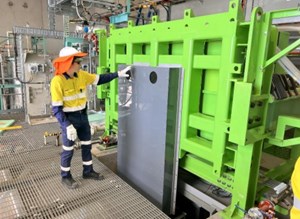News
Australian demonstration plant begins operation toward the development of a CO2-free H2 supply chain
ENEOS Corporation announced that it has constructed a demonstration plant in Brisbane, Queensland, Australia, to produce methylcyclohexane (MCH), a type of H2 carrier, using its proprietary low-cost electrochemical synthesis of organic hydride method (Direct MCH).
ENEOS has worked to scale up electrolyzers using Direct MCH technology to mass produce MCH derived from renewable energy (green MCH). The operation of this demonstration plant is a part of this effort. The 150-kilowatt-scale medium-sized electrolyzer (approximately 200 times larger than the electrolyzer used in the 2021 demonstration), which ENEOS recently succeeded in developing the technology for, consists of stacked electrodes with a surface area of 3 square meters. The electrolyzer realizes increased efficiency in MCH production with electrodes which are nearly the largest by size that is used industrially.
The demonstration plant will produce green MCH by combining the medium-sized electrolyzer with a 250-kilowatt solar power system in Queensland, which is ideal for solar power generation. With the aim of maximizing production efficiency, the plant will confirm the durability of the electrolyzer under subtropical conditions as well as develop optimal operation and control technologies for it when plant operation is adjusted to match fluctuations in solar power during the approximately eight-month-long demonstration period from February to September 2023.
Additionally, during the demonstration period, MCH equivalent to approximately 2 to 3 tons of H2 for 400 to 600 fuel cell vehicles will be produced and transported to Japan, where H2 will be extracted from MCH in ENEOS' Central Technical Research Laboratory.
ENEOS will use the knowledge gained from this demonstration plant to develop a larger-sized 5 megawatt-scale electrolyzer (more than 30 times larger than the medium-sized electrolyzer used in this demonstration plant) for commercialization by FY2025.
ENEOS will work to develop production technology for stable and cost-competitive CO2-free H2 (green H2) in Australia, a country with excellent potential for green H2 production due to its favorable climate conditions, including wind and sunlight, and expansive land, in anticipation of a H2-oriented society toward decarbonization.


